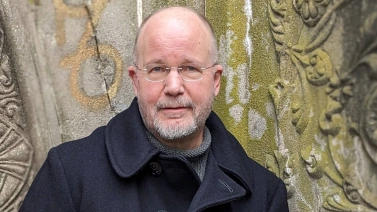
(representation: Eric Lupfer, United Talent Agency, eric.lupfer@unitedtalent.com)
Born in Virginia and raised in Brooklyn, New York, William Hogeland writes books and essays, gives talks, and pursues other projects for print, stage, screen, and audio. His latest book, The Hamilton Scheme: An Epic Tale of Money and Power in the American Founding, is forthcoming from Farrar, Straus and Giroux in May 2024 (audio version narrated by the author). He is best known for his dissenting narrative-history trilogy of the U.S founding — The Whiskey Rebellion (Simon and Schuster), Declaration (Simon and Schuster), and Autumn of the Black Snake (Farrar, Straus and Giroux) — as well as the expository work Founding Finance (University of Texas Press) and a collection of essays, Inventing American History (Boston Review Books/MIT Press).
He began his artistic career, however, as a playwright and performer, with one-man shows at such venues as the Kitchen and Franklin Furnace and full-length plays staged-read and produced at the Williamstown Theater Festival and the Harold Clurman Theater. His first nonfiction work was the memoir Come All You Blackface Freaks and Hillwilliams, exploring the racism in white immersion in roots music and the folk revival’s origins in the 19th-century minstrel stage. Screen rights to his first novel, The Surrender of Washington Hansen, were optioned by Warner Brothers for a script by Joe Carnahan. His play “Last Blue Yodel for the New New Man,” or, “Nineteen Eighty Five,” is available in a recently revised version, with a new preface that also serves as a kind of memoir. He is now working on “The Revenge of Queen Margaret,” a radical adaptation of a group of Shakespeare’s early history plays.
Hogeland’s work in founding American history blends character-driven drama with sharp dissent from the mode sometimes called “founders chic.” His books unearth stories of founding conflicts that are little discussed precisely because they’re elemental, sometimes to uncomfortable degrees. Though written in an accessible style for general readers, and challenging commonly held views of the founding period, the work has been embraced by scholars. Richard Beeman of the University of Pennsylvania calls Hogeland’s work “superb.” John Ferling of the University of West Virginia has called Hogeland “one of the best historians of early America” and described the trilogy as “pulsating and thought-provoking.” Gary Nash of the University of California described the first book in the trilogy as “the most compelling and dramatic rendering of the Whiskey Rebellion ever written.” Jesse Lemisch of CUNY praised the portrait of John Adams in Declaration as “new. . . complex and nuanced.” Kathleen Duval of the University of North Carolina calls Autumn of the Black Snake “a rich and important book.”
Hogeland has published essays on history, music, and politics in The Atlantic Monthly, AlterNet, Salon, The New York Times, Slate, Boston Review, The Huffington Post, Lapham’s Quarterly, and elsewhere. He contributed the chapter on insurrections to A Blackwell Companion to American Military History and the chapter on Ron Chernow to Historians on Hamilton (Rutgers University Press); his essay “American Dreamers,” first published in Boston Review, was selected by Greil Marcus for the tenth anniversary edition of Da Capo’s Best Music Writing.
A busy speaker on subjects ranging from the startling realities of Alexander Hamilton’s national plan of public finance, to the unnamed first war the United States ever fought, to the overlooked backroom politics that brought about the Declaration of Independence, Hogeland has given lively talks for many institutions and groups, including the National Archives, the Museum of American Finance History, Citrin Cooperman Accountants and Advisors, the National Alcohol Beverage Control Association (morning keynote, Aspen CO), Historic Philadelphia, the John Adams National Historic Park, the Pritzker Military Museum and Library, the Free Library of Philadelphia, the Kansas City Public Library, Politics & Prose Bookstore and Coffeehouse, the World Affairs Council of Dallas, the Society for American Music Annual Conference, the American Historical Association Annual Conference, CUNY’s Gotham Center, the Bostonian Society, and Kings County Distilling. He has also served as a history consultant for “The Daily Show” and appeared on PBS TV “History Detectives,” CBS TV “Good Morning, America,” C-SPAN “Book TV,” PCN “PA Books,” “Salon’s Facebook Live,” Minnesota Public Radio, Wisconsin Public Radio, Texas Public Radio, Fox News Radio, and many other broadcast, cable, and online shows and channels.
(photo credit: Mary Ryan, 2024)
